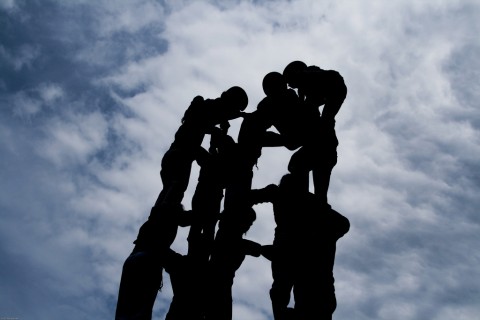Networks: Micro-Collaborations, Moving Love Down the Power Curve
December 11, 2015 Leave a commentThe following is Christine Capra’s thoughtful response to my post on “Deepening Network Practice for Social Change.” Christine is a self-described network mapper, weaver, and guardian with Greater Than the Sum. NOTE: Text that is bolded represents my additions and editorial changes to the original.
She writes:
I spend a lot of time pondering the above questions [see post] as well, and appreciate your thoughts here. It’s very helpful.
Re: ‘going beyond abstraction to interaction’, Yes! And even further than interaction – in the past year or so, I’ve developed a deep appreciation for something June Holley said to me awhile back – ‘I always say – start with micro-collaborations.’
In my own experience, being in a small group (a pair or trio), with small but tangible work tasks, in a relatively safe-fail context, that requires a level of clear and intentional communication (beyond all the professing of values amd beliefs that fledgling communities/networks sometimes circle around endlessly), and the opportunity to rely on one another and prove our own reliability to another in some small, safe way – that leads to trust faster than any amount of talk, and that trust leads to love a lot quicker than other approaches.
And once love is there, we can, and we tend to, start bigger projects and take bigger risks together than we would on our own. (In fact, I can easily trace every single thing I work on today, back to the seed of a micro-collaboration sometime in the past – and the love that developed.) And when shared-work falters, we get to practice crucial skills (better communication, discovering what needs to change). And if that fails – then we know our work efforts are better spent elsewhere, and we’re free to pursue greater effectiveness with someone else. Without testing bonds by putting a little weight on them, we often spend a lot more time circling than changing.
I agree that love is A, if not THE, crucial leverage point – or, it’s the thing that can mitigate the power-curve. And yet, to people high on the power curve, a cozy sense of connection, mutual respect, & recognition is often adequate. But for people low on the power curve – ‘connection’ and ‘love’ are inherently built on some kind of mutual support & attending to shared material/worldly vulnerability. Love doesn’t mean much if it doesn’t help to ameliorate your unnecessary suffering. Which means actually changing something.
I guess what I’m saying is that moving love down the power curve requires co-creating new conditions for those at the lower end. Warm fuzzies are lovely, but not enough. And micro-collaborations are a good way to begin that journey.



